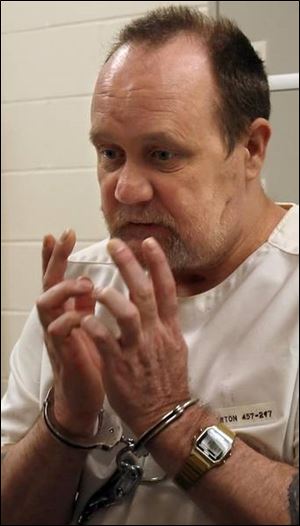
Death-row inmate fights to keep date with destiny
7/2/2006
Rocky Barton says he can handle prison life, but the guilt he feels for killing his wife is 'eating me up inside.'
MANSFIELD - Rocky Barton would rather die now than spend his next two decades on Ohio's death row fighting execution.
Before the former southwest Ohio man twice shot his 44-year-old wife, Kimbirli Jo, he vowed he never would return to prison. As his wife lay dying, he placed the barrel of the shotgun under his chin and fired.
After his conviction months later, Barton, his face surgically rebuilt after the shotgun blast, urged the jury to sentence him to death. He refused to cooperate with his own clemency hearing.
And tomorrow, Barton plans to urge a Warren County judge to fire his court-appointed attorney, Christopher Pagan, because he's questioned Barton's competency to make the decision to accelerate his execution by becoming the fifth Ohio inmate to prematurely end his appeals.
"I can handle the prison life," Barton told The Blade during an interview conducted last week on behalf of the Ohio Legislative Correspondents Association.
"It's living with the guilt," he said. "I figure, why should I lay around in here for 10 or 20 years fighting it when it's eating me up inside."
If his execution is carried out on July 12 as scheduled, it would occur less than three years and six months after his crime. That would be a record in a state where appeals take an average of 16 years.
Barton, 49, is one of 39 death-row inmates who remain at Mansfield Correctional Institution. Because of mental-health issues, they have not been moved to the new death row at the Ohio State Penitentiary at Youngstown.
"There's not much you can do," he said. "Exercise a little bit, watch TV, and read."
Once a day, he is permitted in the enclosed recreation yard adjacent to his prison unit where he and four other death-row inmates play basketball and handball. He said he has visitors - his parents, sisters, uncles, the prison chaplain - but his routine is mostly meals, reading the Bible, pull-ups, push-ups, and sit-ups.
He said he had more freedom when he served 10 years in prison in Kentucky for the attempted murder of his second ex-wife, whom he refused to discuss. He was in the prison's general population there before he was paroled and returned to Ohio.
Chief Deputy Attorney General Jim Canepa said he doesn't believe life on death row is responsible for Barton's decision to pursue execution.
"Death row, if you were to look at creature comforts and accessibility to things the other population doesn't have, is the preferred place to be," he said. "Compared to the general population, you're less likely to be victimized by other inmates. You have better access to experts for health care, medical needs, [and] lawyering. For better or worse, you're 'special.' "
Barton said he deserves to die.
"I think it's a very terrible thing that I done," he said. "It was a senseless murder. My wife was a beautiful person. She didn't deserve to die."
Kimbirli, a close friend since high school, became Barton's fourth wife while he was serving time in Kentucky.
On Jan. 16, 2003, after she informed him she was leaving and returned to their house in Waynesville, Ohio, to retrieve her belongings, Barton emerged from the garage carrying a shotgun.
His uncle, whom he'd talked to earlier on the phone, also arrived at the house.
Barton said his original plan was to kill himself in front of Kimbirli, and he said he can't explain today why he instead turned the gun on her. He dropped to his knees in front of his uncle's pickup, said, "I told you I was insane," placed the barrel under his chin, and fired.
He pointed inside his mouth to show the trajectory of the shotgun blast.
"I blowed out all my teeth except for 11," he said. "I had four major surgeries for reconstructing my face. I have two metal plates holding my eyeballs in the socket. ... I got a cadaver chin, so I got pins, and wires, and screws connecting that."
Mr. Pagan, Barton's Middletown attorney, has forged ahead with the competency hearing against Barton's wishes. He said he knows he's flirting with an ethical line.
"I know Rocky wants the execution, but I've also seen the psychological records produced at the prison, and those indicate that he has major depression with psychotic features and hallucinations," he said. "He's medicated and has attempted suicide. He has given me different indications of whether I should defend the case."
When death-row inmates get together in the recreation yard, they sometimes share information, including what happened on May 2 when Joseph Lewis Clark, a 57-year-old Toledo native, was executed after spending 22 years on death row.
The execution team struggled to find usable veins in Clark's arms, and the one intravenous line it proceeded with collapsed early in the process.
Clark raised and shook his head, repeatedly saying, "It don't work." Witnesses could hear him moaning and groaning for several minutes even after the curtain separating them from the execution chamber had been closed.
Even as Clark's execution has fueled efforts to challenge the constitutionality of the lethal-injection process, along comes Barton, who, unlike Clark, is a "volunteer."
Barton didn't know Clark, and he said Clark's experience has not prompted him to reconsider his decision.
"I got good veins," he said. "I understand he was a drug addict and his veins collapsed. All during my surgeries, I had good veins. They never really had no trouble except for there at the end one time they had trouble finding a vein on me, but that was after months of having needles stuck in me."
Contact Jim Provance at: jprovance@theblade.com or 614-221-0496.